|
|
|
Sort Order |
|
|
|
Items / Page
|
|
|
|
|
|
|
| Srl | Item |
| 1 |
ID:
050920
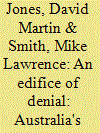

|
|
|
| 2 |
ID:
155659
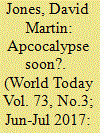

|
|
|
| 3 |
ID:
075179
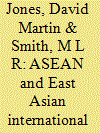

|
|
|
|
|
| Publication |
Cheltenham, Edward Elgar, 2006.
|
| Description |
xi, 269p.Hbk
|
| Standard Number |
1843764911
|
|
|
|
|
|
|
|
|
|
|
|
Copies: C:1/I:0,R:0,Q:0
Circulation
| Accession# | Call# | Current Location | Status | Policy | Location |
| 051960 | 909.09823083/JON 051960 | Main | On Shelf | General | |
|
|
|
|
| 4 |
ID:
193095
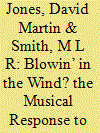

|
|
|
|
|
| Summary/Abstract |
Popular music was the most immediate way in which the cultural response to 9/11 manifested itself. Initially music offered a way of mourning and coping with grief. As the United States moved toward the invasion of Iraq, pop music also began to reflect the divisions in society between patriot-artists who supported the invasion, most notably in country music, and protest-artists who articulated critical attitudes to war. These anti-war songs did not attain the stature of those that characterized the era of protest during the Vietnam War, nor did they offer a musical accompaniment to a social movement with any enduring political significance. One little observed dissonance that a longitudinal survey of the musical response to political violence reveals, however, is that over time the attitudes of protest songwriters and the patriots transvalued. Ironically, interventionist “rednecks” became disillusioned with the endless wars of intervention, whilst the “protest” writers lost their voices after President Obama came to power. Ironically, icons of popular music instead turned their ire on those who voted for an anti-establishment President Trump who vowed not to involve the U.S. in further military adventures.
|
|
|
|
|
|
|
|
|
|
|
|
|
|
|
|
| 5 |
ID:
075440
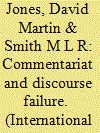

|
|
|
| 6 |
ID:
115009
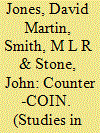

|
|
|
|
|
| Publication |
2012.
|
| Summary/Abstract |
The notion of "counterinsurgency" (COIN) has for some years been the central concept driving military operations in Afghanistan, and before that, in Iraq. It constitutes the dominant idea influencing much current military planning of the major Western powers. This study questions the assumptions and relevance of the thinking behind counterinsurgency doctrine. It suggests that the ultimate effect of its dominance is to reduce the highly contingent nature of war to a list of techniques, the application of which are regarded as a sufficient precondition whenever states deem that they are confronted by conflicts that can be described as an "insurgency." Such assumptions are both arbitrary and risk crowding out necessary, although by their nature very difficult, political judgments that are required for the effective construction and implementation of strategies that seek to ensure that the ends sought are proportional to the means employed.
|
|
|
|
|
|
|
|
|
|
|
|
|
|
|
|
| 7 |
ID:
023165
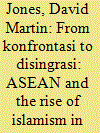

|
|
|
|
|
| Publication |
2002.
|
| Description |
343-356
|
|
|
|
|
|
|
|
|
|
|
|
|
|
|
|
| 8 |
ID:
096545
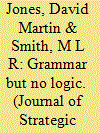

|
|
|
| 9 |
ID:
066018
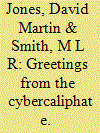

|
|
|
| 10 |
ID:
155482
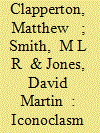

|
|
|
|
|
| Summary/Abstract |
This article analyses the way in which the group calling itself the Islamic State in Iraq and Syria (Islamic State) manages cultural heritage sites under its control. By drawing on three different cases—Palmyra; Sufi, Shi'a and Sunni heritage sites; and Mosul—it examines the way in which the logic of Islamic State's iconoclasm might also be considered a strategy. To be considered strategic the contention is that three factors need to prevail: the degradation and delegitimization of the existing societal fabric, the removal of all reference to the previous society, and an attempt to reconstruct society in keeping with a new ideological vision. When these three factors are present and interconnected then iconoclasm as a strategy can be said to be manifest. In the case of Islamic State, this article also seeks to illustrate that its actions may broadly be categorized as either pragmatic or dogmatic, thus creating an inconsistent dichotomy within Islamic State's rhetoric. The article frames such a dichotomy within the context of a strategic narrative both in order to be able to connect pragmatic Islamic State policy to action and to show that when rigid doctrine clashes with the exceptionality of war an irresolvable paradox is created.
|
|
|
|
|
|
|
|
|
|
|
|
|
|
|
|
| 11 |
ID:
164180
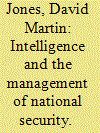

|
|
|
|
|
| Summary/Abstract |
Since 2001 expenditure on the security services has increased exponentially in Western democracies and particularly amongst the Five Eyes community of the UK, the US, Canada, Australia and New Zealand. This has occurred in conjunction with the expansion of counter-terror laws. Yet somewhat problematically the phenomenon of Islamist inspired violence became more threatening to the internal security of western democracies in the first decade of the twenty-first century. This study examines the Western managerial approach to security using Australia as a case study. It argues that the growth of Australian security agencies since 2001 and their evolution into a National Security Community after 2008 has neglected basic maxims of political and constitutional prudence and eschews the modern state’s own contractual self -understanding of sovereignty and political obligation.
|
|
|
|
|
|
|
|
|
|
|
|
|
|
|
|
| 12 |
ID:
056789


|
|
|
| 13 |
ID:
080686
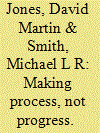

|
|
|
|
|
| Publication |
2007.
|
| Summary/Abstract |
Since the Asian financial crisis of 1998, regional scholars and diplomats have maintained that the Association of Southeast Asian Nations (ASEAN) represents an evolving economic and security community. In addition, many contend that what is known as the ASEAN process not only has transformed Southeast Asia's international relations, but has started to build a shared East Asian regional identity. ASEAN's deeper integration into a security, economic, and political community, as well as its extension into the ASEAN Plus Three processes that were begun after the 1997 financial crisis, offers a test case of the dominant assumptions in both ASEAN scholarship and liberal and idealist accounts of international relations theory. Three case studies of ASEAN operating as an economic and security community demonstrate, however, that the norms and practices that ASEAN promotes, rather than creating an integrated community, can only sustain a pattern of limited intergovernmental and bureaucratically rigid interaction.
|
|
|
|
|
|
|
|
|
|
|
|
|
|
|
|
| 14 |
ID:
111160
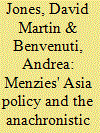

|
|
|
|
|
| Publication |
2012.
|
| Summary/Abstract |
A powerful orthodoxy exists in the academic literature devoted to the history of Australia's post-1945 international relations. It maintains that suspicion and condescension permeated the attitude of the Menzies government (1949-66) towards Asia. Accordingly, Menzies' regional policies not only prevented Australia from engaging meaningfully with its Asian neighbours, but they also ended up antagonising them. This article critiques this view and instead contends that the assumptions that inform the contemporary construction of Menzies' regional policy are overdetermined by an anachronistic disregard for the diplomatic dynamics, political challenges and economic realities of cold war Asia.
|
|
|
|
|
|
|
|
|
|
|
|
|
|
|
|
| 15 |
ID:
017541
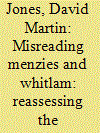

|
|
|
|
|
| Publication |
July 2000.
|
| Description |
387-406
|
| Summary/Abstract |
Conventional understandings of Australian foreign policy hold that a decisive break with the past in external relations occurred only after 1972 and the arrival of Gough Whitlam as Prime Minister. Whitlam, it is claimed, began the process of severing out-dated imperial attachments to Britain, thus setting Australia on an independent course in world affairs based on a more mature assessment of the national interest that defined Australia as part of a wider Asia region. In contrast, the period between 1949 and 1972—an era dominated by the premiership of Sir Robert Menzies—is seen as a time of docile subservience to great power protectors, which sustained a conservative and reactionary monoculture at home while alienating Australia’s Asian neighbours abroad. This study contends that this understanding of the beginning of the ‘modern’ era in Australian foreign policy does not accord with the historical evidence. It is, instead, an image that has been ideologically constructed to legitimize Whitlam’s self-proclaimed revolution in foreign affairs and to validate the abortive attempt to integrate Australia into Asia during the 1980s and 1990s. The ruling foreign policy orthodoxy, however, is one that is widely accepted, and little questioned, in Australian academic and journalistic circles. Yet it rests on a profound, and often intentional, misreading of Australian foreign policy during the Menzies era. In effect, the pillars that have supported Australian foreign policy for over two decades since 1972 are myths manufactured in hindsight.
|
|
|
|
|
|
|
|
|
|
|
|
|
|
|
|
| 16 |
ID:
122220
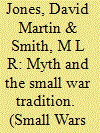

|
|
|
|
|
| Publication |
2013.
|
| Summary/Abstract |
In recent years a number of commentators have posited that the British reputation for conducting small wars has suffered in the wake of setbacks in Iraq and Afghanistan. The argument here contests whether such a tradition can be truly said to have ever existed. A close examination of this supposed tradition reveals it to be a myth. In fact, rarely have the British armed forces claimed a facility for counter-insurgency or small war. Invariably, commentators outside the Army have ascribed the tradition to them. Most notably, commentators in the United States keen to discern practices of minimum force or rapid institutional learning generated the narrative of British COIN expertise. Ultimately, what this myth reveals is that, when deconstructed, it is political will, not an ingrained understanding of fighting insurgencies, that has determined Britain's success, or otherwise, in so-called small wars.
|
|
|
|
|
|
|
|
|
|
|
|
|
|
|
|
| 17 |
ID:
141277
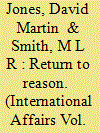

|
|
|
|
|
| Summary/Abstract |
Twenty-first-century political crises stretching from Europe to the Middle East and the Asia–Pacific have undermined the worldview that governed post-Cold War western thinking about a liberal end of history. This worldview assumed that shared norms and transnational institutions would transform the state based-order. In this context, the use of force is considered appropriate only for humanitarian ends meeting a set of predetermined axioms laid down in chapter 7 of the UN Charter. Yet for any strategy to be effective—in an international order subject to change—a clear political aim is required, which might deviate from the general rule. Preoccupied with universal postulates, legal normativism has lost sight of the particular. The argument put forth in this article is that the failure of contemporary western foreign policy in the twenty-first century to address this limitation or to prioritize political ends has led to strategic confusion from Afghanistan to Syria and Ukraine. In this context, it might be useful to reappraise the utility of abstract rationalist approaches to global governance and return instead to an earlier understanding of statecraft that avoided premature generalizations and treated norms as maxims of prudence rather than axioms requiring universal application.
|
|
|
|
|
|
|
|
|
|
|
|
|
|
|
|
| 18 |
ID:
144862
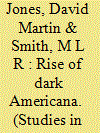

|
|
|
|
|
| Summary/Abstract |
In the wake of the 9/11 attacks the American film industry took a while to react to the Islamist threat at home and abroad. From 2005, however, Hollywood responded to the threat to the homeland and the War on Terror “over there” in Iraq and Afghanistan in a variety of ways. This article examines the nature of that response and whether it evinces, as critics allege, that the American film industry reflects and shapes a capitalist and imperialist agenda. More particularly, by evaluating the cinematic treatment of both the Iraq war and the problem of surveillance, rendition, and homeland security, the analysis explores what this distinctive on-screen genre tells about how the U.S. cultural mainstream has dealt with the challenge global jihadism poses to American values. The analysis suggests that post-9/11 movie making, while sometimes bleak and often clichéd, is cognizant of the gray area morality inherent in fighting the “War on Terror,” and is still thus able to offer some possibilities for sophisticated reflection.
|
|
|
|
|
|
|
|
|
|
|
|
|
|
|
|
| 19 |
ID:
083076
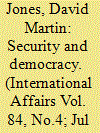

|
|
|
|
|
| Publication |
2008.
|
| Summary/Abstract |
In November 2007, the heads of the ten member governments of the Association of South-East Asian Nations (ASEAN) signed a charter that will, once ratified, give the association a legal personality. The charter, significantly, requires more of its members than a reassertion of the traditional ASEAN norm of non-interference and the practice of consensus. The charter lists a number of novel goals among the organization's purposes: 'to strengthen democracy, enhance good governance and the rule of law, and to promote and protect human rights and fundamental freedoms.' In view of the wide economic and political disparities between the member states of ASEAN, this article examines whether strengthening democracy would in fact facilitate ASEAN's goal of becoming an integrated political, economic and security community. Rather than enhancing an integrated community, democratization would arguably create a faultline between the more politically mature and economically developed states and a northern tier of less developed, authoritarian single-party dominant regimes in South-East Asia. Moreover, given China's emerging political and economic importance to the region, such a strategy would, as if by an invisible hand, draw the more authoritarian ASEAN states into China's less than democratic embrace. This article concludes that rather than strengthening democracy, ASEAN's charter needs urgently to reinforce practices of rule governance and mechanisms of market integration to enhance both ASEAN's economic profile as well as the region's autonomy
|
|
|
|
|
|
|
|
|
|
|
|
|
|
|
|
| 20 |
ID:
099495
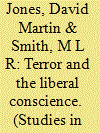

|
|
|
|
|
| Publication |
2010.
|
| Summary/Abstract |
After the attacks on the World Trade Center and Washington, D.C. in 2001 the Library of Congress Cataloging-in-Publication devised a new classification. The category, September 11 Terrorist Attacks 2001-Fiction, responds to a distinct genre of political novels. In the light of the philosopher Richard Rorty's contention that the Western novel can clarify the moral and political options that confront the West, the article examines what insight, if any, into the motive for violence, and the capacity to recuperate a sense of liberal progressive purpose, the novels of 11 September afford?
|
|
|
|
|
|
|
|
|
|
|
|
|
|
|
|
|
|
|
|
|